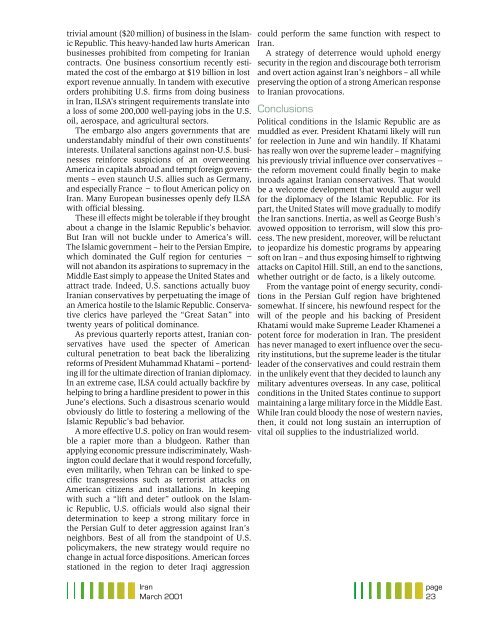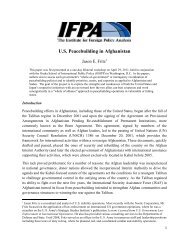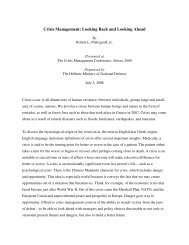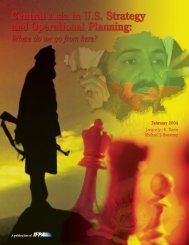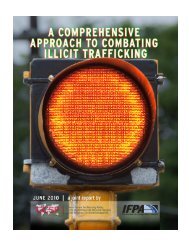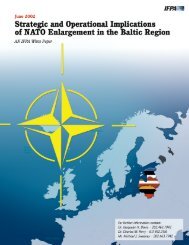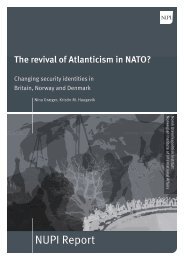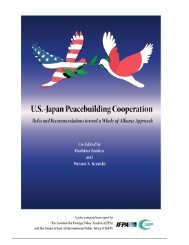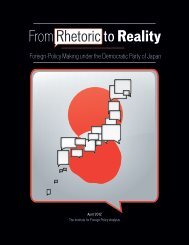March 2001 - Institute for Foreign Policy Analysis
March 2001 - Institute for Foreign Policy Analysis
March 2001 - Institute for Foreign Policy Analysis
Create successful ePaper yourself
Turn your PDF publications into a flip-book with our unique Google optimized e-Paper software.
trivial amount ($20 million) of business in the Islamic<br />
Republic. This heavy-handed law hurts American<br />
businesses prohibited from competing <strong>for</strong> Iranian<br />
contracts. One business consortium recently estimated<br />
the cost of the embargo at $19 billion in lost<br />
export revenue annually. In tandem with executive<br />
orders prohibiting U.S. firms from doing business<br />
in Iran, ILSA’s stringent requirements translate into<br />
a loss of some 200,000 well-paying jobs in the U.S.<br />
oil, aerospace, and agricultural sectors.<br />
The embargo also angers governments that are<br />
understandably mindful of their own constituents’<br />
interests. Unilateral sanctions against non-U.S. businesses<br />
rein<strong>for</strong>ce suspicions of an overweening<br />
America in capitals abroad and tempt <strong>for</strong>eign governments<br />
– even staunch U.S. allies such as Germany,<br />
and especially France − to flout American policy on<br />
Iran. Many European businesses openly defy ILSA<br />
with official blessing.<br />
These ill effects might be tolerable if they brought<br />
about a change in the Islamic Republic’s behavior.<br />
But Iran will not buckle under to America’s will.<br />
The Islamic government – heir to the Persian Empire,<br />
which dominated the Gulf region <strong>for</strong> centuries −<br />
will not abandon its aspirations to supremacy in the<br />
Middle East simply to appease the United States and<br />
attract trade. Indeed, U.S. sanctions actually buoy<br />
Iranian conservatives by perpetuating the image of<br />
an America hostile to the Islamic Republic. Conservative<br />
clerics have parleyed the “Great Satan” into<br />
twenty years of political dominance.<br />
As previous quarterly reports attest, Iranian conservatives<br />
have used the specter of American<br />
cultural penetration to beat back the liberalizing<br />
re<strong>for</strong>ms of President Muhammad Khatami – portending<br />
ill <strong>for</strong> the ultimate direction of Iranian diplomacy.<br />
In an extreme case, ILSA could actually backfire by<br />
helping to bring a hardline president to power in this<br />
June’s elections. Such a disastrous scenario would<br />
obviously do little to fostering a mellowing of the<br />
Islamic Republic’s bad behavior.<br />
A more effective U.S. policy on Iran would resemble<br />
a rapier more than a bludgeon. Rather than<br />
applying economic pressure indiscriminately, Washington<br />
could declare that it would respond <strong>for</strong>cefully,<br />
even militarily, when Tehran can be linked to specific<br />
transgressions such as terrorist attacks on<br />
American citizens and installations. In keeping<br />
with such a “lift and deter” outlook on the Islamic<br />
Republic, U.S. officials would also signal their<br />
determination to keep a strong military <strong>for</strong>ce in<br />
the Persian Gulf to deter aggression against Iran’s<br />
neighbors. Best of all from the standpoint of U.S.<br />
policymakers, the new strategy would require no<br />
change in actual <strong>for</strong>ce dispositions. American <strong>for</strong>ces<br />
stationed in the region to deter Iraqi aggression<br />
could per<strong>for</strong>m the same function with respect to<br />
Iran.<br />
A strategy of deterrence would uphold energy<br />
security in the region and discourage both terrorism<br />
and overt action against Iran’s neighbors – all while<br />
preserving the option of a strong American response<br />
to Iranian provocations.<br />
Conclusions<br />
Political conditions in the Islamic Republic are as<br />
muddled as ever. President Khatami likely will run<br />
<strong>for</strong> reelection in June and win handily. If Khatami<br />
has really won over the supreme leader – magnifying<br />
his previously trivial influence over conservatives --<br />
the re<strong>for</strong>m movement could finally begin to make<br />
inroads against Iranian conservatives. That would<br />
be a welcome development that would augur well<br />
<strong>for</strong> the diplomacy of the Islamic Republic. For its<br />
part, the United States will move gradually to modify<br />
the Iran sanctions. Inertia, as well as George Bush’s<br />
avowed opposition to terrorism, will slow this process.<br />
The new president, moreover, will be reluctant<br />
to jeopardize his domestic programs by appearing<br />
soft on Iran – and thus exposing himself to rightwing<br />
attacks on Capitol Hill. Still, an end to the sanctions,<br />
whether outright or de facto, is a likely outcome.<br />
From the vantage point of energy security, conditions<br />
in the Persian Gulf region have brightened<br />
somewhat. If sincere, his newfound respect <strong>for</strong> the<br />
will of the people and his backing of President<br />
Khatami would make Supreme Leader Khamenei a<br />
potent <strong>for</strong>ce <strong>for</strong> moderation in Iran. The president<br />
has never managed to exert influence over the security<br />
institutions, but the supreme leader is the titular<br />
leader of the conservatives and could restrain them<br />
in the unlikely event that they decided to launch any<br />
military adventures overseas. In any case, political<br />
conditions in the United States continue to support<br />
maintaining a large military <strong>for</strong>ce in the Middle East.<br />
While Iran could bloody the nose of western navies,<br />
then, it could not long sustain an interruption of<br />
vital oil supplies to the industrialized world.<br />
Iran<br />
<strong>March</strong> <strong>2001</strong><br />
page<br />
23


